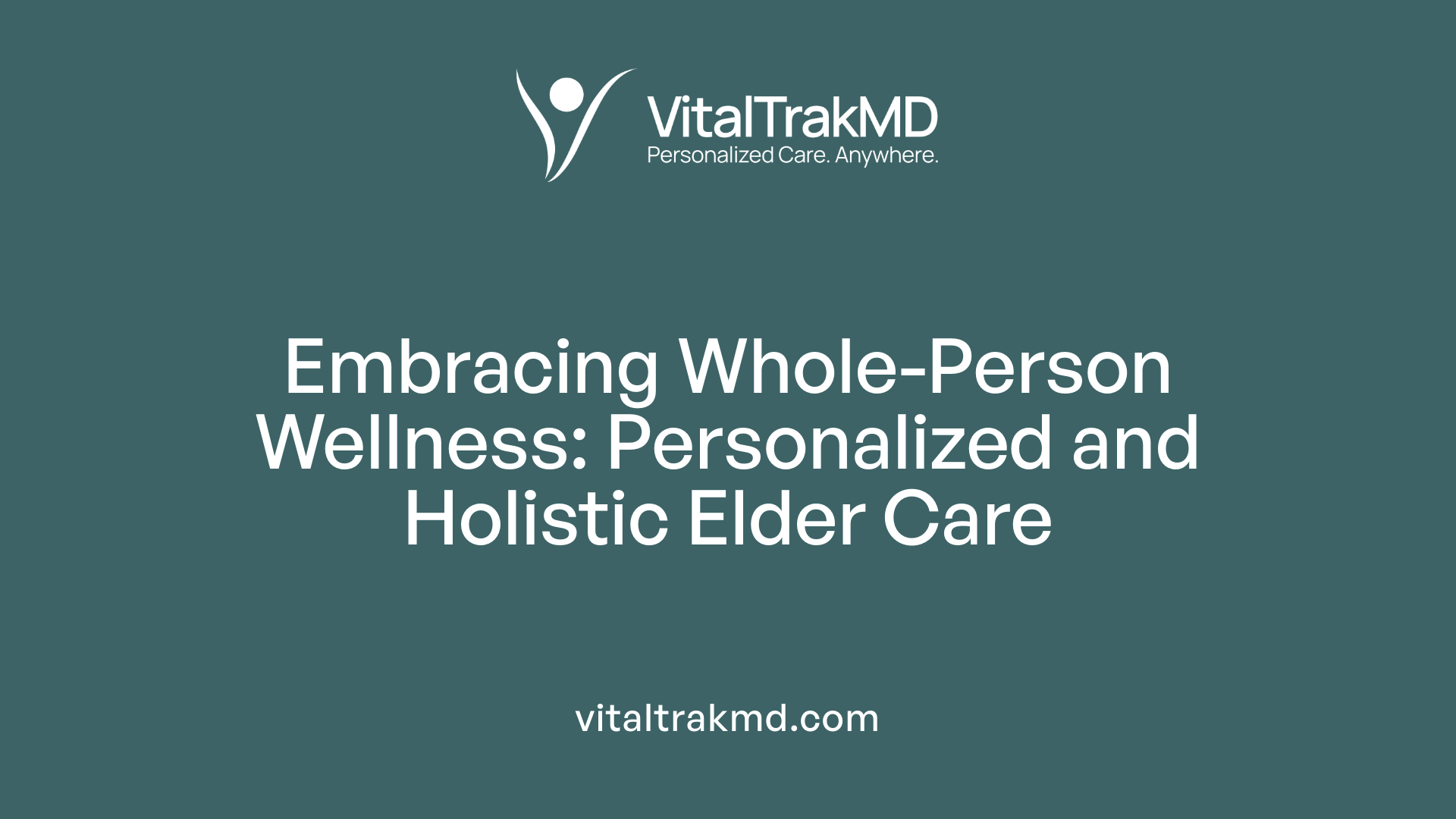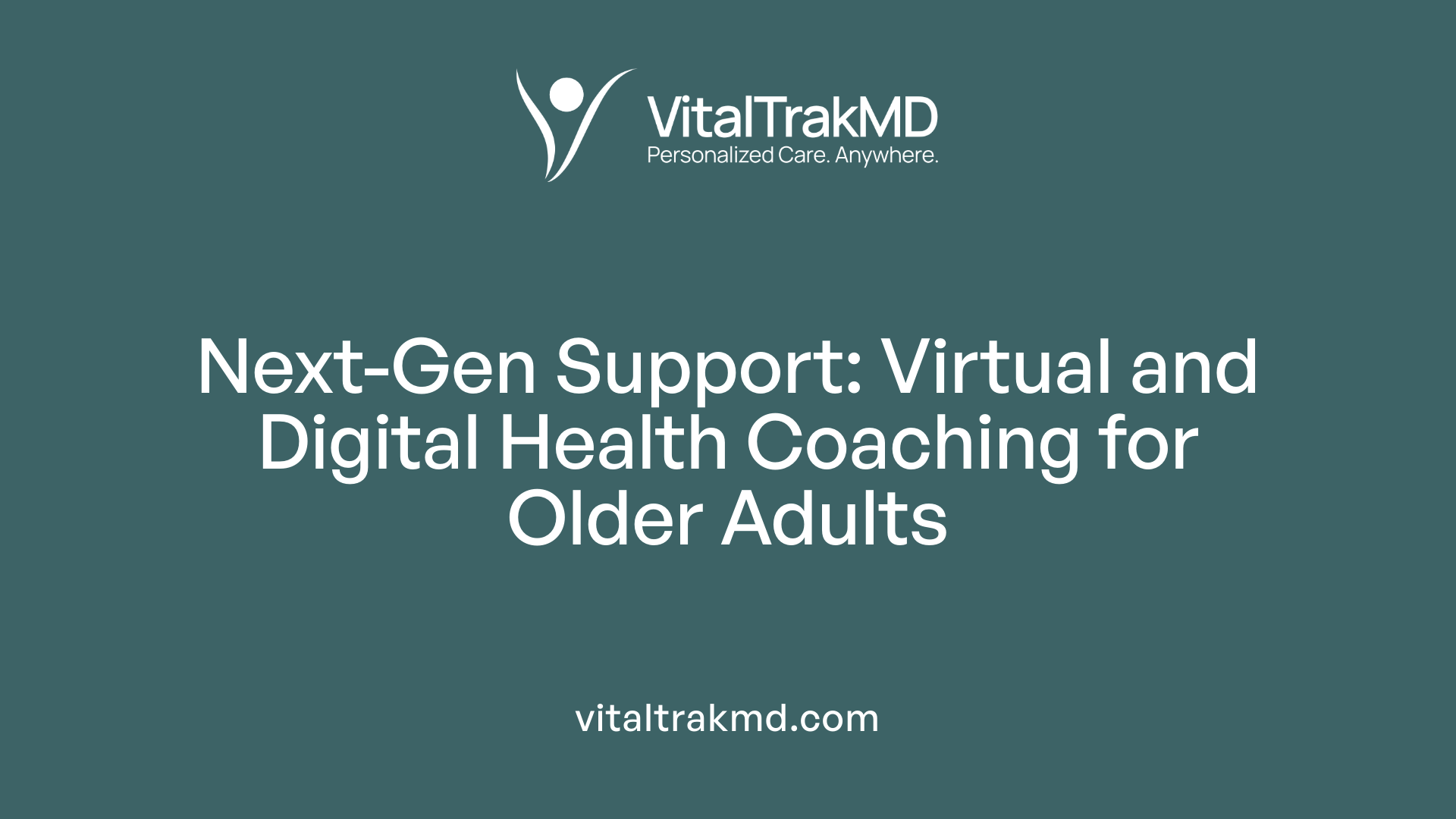How Personal Health Coaching Enhances Long-Term Senior Health Outcomes

Introduction: Understanding the Impact of Personal Health Coaching on Aging Populations
As the global population ages, ensuring the health and well-being of seniors becomes increasingly critical. Personal health coaching emerges as a promising approach to support long-term health outcomes by fostering self-management, behavioral change, and holistic well-being for older adults. This article explores how tailored coaching interventions contribute to sustained health improvements, drawing on robust evidence from diverse studies.
Core Components of Effective Health Coaching
 Effective health coaching relies on fundamental principles that create a supportive environment and foster meaningful change. These principles include Mindful Presence, where coaches engage fully and actively listen to clients, building trust and understanding. Authentic Communication is essential, involving honest, empathetic interactions that help clients feel understood and motivated.
Effective health coaching relies on fundamental principles that create a supportive environment and foster meaningful change. These principles include Mindful Presence, where coaches engage fully and actively listen to clients, building trust and understanding. Authentic Communication is essential, involving honest, empathetic interactions that help clients feel understood and motivated.
Self-awareness plays a vital role, enabling clients to recognize their behaviors, motivations, and beliefs, which is crucial for initiating and maintaining health behavior changes. Creating a Safe and Sacred Space means establishing a trusting, non-judgmental environment where clients feel comfortable exploring challenges and setbacks.
Research consistently shows that these core elements are critical in supporting sustainable health improvements. They serve as the backbone of coaching strategies, ensuring that interventions are client-centered and respect individual contexts.
When these pillars work together, they empower older adults and caregivers to develop confidence, improve health literacy, and adopt healthier behaviors such as regular physical activity, better nutrition, and stress management. This holistic approach, strengthened by scientific and clinical evidence, highlights the importance of these foundational components for long-term health success in senior care.
| Core Components | Description | Supporting Evidence |
|---|---|---|
| Mindful Presence | Coaches engage fully and listen attentively | Studies indicate that genuine engagement improves trust and outcomes |
| Authentic Communication | Honest, empathetic dialogue to foster understanding | Effective in building rapport and motivating behavior change |
| Self-awareness | Clients recognize their habits and motivations | Linked to better self-management and sustainable change |
| Safe and Sacred Space | Trustworthy environment for vulnerability | Essential for exploring barriers and facilitating growth |
These pillars create a dynamic framework that guides health coaching sessions, especially in senior care, contributing to improved health metrics, increased activation, and sustained lifestyle changes.
Holistic and Person-Centered Care in Older Adults

What role does personalized health support and holistic care play in improving health outcomes for older adults?
Personalized health support is crucial in tailoring care plans that meet each older adult's unique needs, preferences, and health conditions. This approach encourages active participation from seniors in managing their health, which boosts self-efficacy and compliance with treatment regimens.
Holistic care expands the focus beyond physical symptoms to include emotional, social, spiritual, and mental health. Such comprehensive strategies incorporate mindfulness, nutrition, physical activity, and alternative therapies that promote overall well-being.
For example, integrating spiritual practices or respecting religious preferences can significantly enhance mental health and provide comfort, ultimately contributing to better quality of life.
This person-centered approach fosters a respectful, trusting relationship between healthcare providers and older adults. It involves shared decision-making and ongoing adjustments to care plans, which increase engagement and satisfaction.
Research indicates that when care addresses multiple aspects of well-being simultaneously, health outcomes improve measurably. These include better management of chronic conditions, enhanced mental health, and reduced anxiety and depression.
Overall, combining personalized support with holistic practices creates a comprehensive framework. This framework not only addresses immediate health issues but also supports aging with vitality, independence, and dignity.
Evidence for Long-Term Benefits of Health Coaching in Seniors

What evidence supports the effectiveness of health coaching for seniors’ health and well-being?
A growing body of research, including multiple randomized controlled trials, underscores the positive impact of health coaching on older adults' health outcomes. These studies indicate that coaching significantly boosts physical activity, enhances self-efficacy, and improves mental health among seniors.
For instance, interventions involving older adults with multiple chronic conditions have shown notable health improvements. These include increased exercise behaviors, better management of cognitive symptoms, reduced depression, and greater social participation. One trial targeting nursing home residents reported that participants experienced enhanced self-rated health and decreased feelings of illness intrusiveness.
Physiological benefits also emerge from health coaching, such as decreases in systolic blood pressure by approximately 5-10 mmHg and improvements in cholesterol levels by 10-15 points. These changes are key contributors to reducing the risk of heart disease and stroke.
Furthermore, studies reveal sustained benefits over time. After 3 to 6 months of coaching, many seniors maintained higher self-efficacy scores and healthier behavior patterns. The evidence underscores that regular, structured coaching not only yields immediate improvements but also promotes long-term health management.
In summary, high-quality evidence supports health coaching as an effective tool for improving both behavioral and physiological aspects of health among aging populations, fostering healthier, more independent lives.
| Study Focus | Outcomes | Duration | Significant Findings |
|---|---|---|---|
| Multimorbidity in Nursing Homes | Exercise, cognitive management, depression | Several months | Improved health behaviors and mental health |
| Blood Pressure and Cholesterol | Blood pressure, cholesterol | 12 weeks+ | Blood pressure drops, cholesterol improvements |
| Long-Term Maintenance | Self-efficacy, health behaviors | 3-6 months | Sustained health benefits |
| Overall Impact | Quality of life, social engagement | Multiple studies | Enhanced well-being and independence |
This extensive evidence base affirms that health coaching is a valuable strategy for supporting seniors' health over the long term, making it an integral part of aging and chronic disease management.
Health Coaching’s Role in Long-Term Self-Management of Chronic Conditions

How does health coaching improve long-term health outcomes in seniors?
Health coaching plays a significant role in helping older adults manage chronic conditions effectively over time. It fosters continuous engagement in health behaviors such as physical activity, proper nutrition, medication adherence, and symptom tracking. Through personalized strategies, health coaching boosts self-efficacy—the confidence in one’s ability to succeed—which is fundamental to maintaining healthy habits.
Techniques like Motivational Interviewing and Cognitive Behavioral Therapy are often utilized within coaching sessions to motivate and support behavior changes. These methods help seniors develop practical skills, overcome barriers, and sustain lifestyle modifications.
Research indicates that effective health coaching impacts both physiological health indicators—such as blood pressure and blood sugar—and psychosocial well-being, translating into better long-term outcomes. The interventions are grounded in evidence-based theories, like the Theory of Patient Capacity, focusing on enhancing individuals' ability to manage their health within their existing capacities.
A crucial component of long-term success is the role of patient activation, which mediates the relationship between coaching and health behaviors. As seniors become more knowledgeable and confident, they are more likely to adhere to treatment plans and maintain healthy routines, reducing disease progression and enhancing their overall quality of life.
| Aspect | Effect | Additional Details |
|---|---|---|
| Self-efficacy | Increased | Leads to greater confidence in managing health |
| Behavior change techniques | Improved | Focused on diet, activity, medication |
| Lifestyle modifications | Sustained | Longer-term adherence to healthy habits |
| Patient activation | Mediator | Connects coaching to actual behavior change |
The cumulative evidence underscores the importance of personalized, theory-driven health coaching to promote resilience, independence, and improved health among seniors.
Innovative Delivery Modes of Health Coaching for Seniors

What evidence supports the efficacy of virtual and digital health coaching for older adults?
Virtual and digital health coaching methods are gaining traction as effective tools to improve health outcomes among seniors. Research highlights several successful programs demonstrating their impact.
One notable example is the Virtual Care Coordination for You (ViCCY) trial, which involved caregivers of adults with heart failure. This program included 10 virtual support sessions with health coaches, complemented by tablets preloaded with trusted websites to provide information and support. Results showed significant improvements in caregivers' self-care maintenance and perceived stress levels, revealing how virtual coaching can effectively foster health behavior change.
Similarly, the Healthy Lifetime (HL) program—delivered entirely online via videoconferencing—focused on early intervention to enhance self-care and independent functioning among adults aged 50 and older with chronic illnesses. Participants engaged in weekly 30-minute coaching sessions, learning crucial skills for managing their health. The study reported that these participants exhibited sustained behavioral changes in exercise, diet, and alcohol consumption, with positive effects lasting for at least 20 weeks.
Mobile health (mHealth) technology also plays a vital role. Apps equipped with self-monitoring features have improved digital health literacy among seniors, aiding in better adherence to health plans. Participants could track their health data, receive reminders, and communicate directly with health coaches, which increased motivation and engagement.
These virtual approaches are particularly valuable during times like the COVID-19 pandemic, when social distancing limits in-person interactions. They support scalable, accessible health promotion, offering convenience for seniors in remote regions or with mobility challenges. Importantly, evidence indicates these interventions lead to measurable health benefits, including improved self-management, reduced stress, better health habits, and increased confidence—crucial components for aging well.
In conclusion, virtual and digital health coaching programs provide flexible, effective, and scalable options to support older adults in managing chronic conditions, promoting healthy lifestyles, and maintaining independence.
Technology-Enabled Support Systems in Elder Care
How do digital health technologies enhance long-term health support for seniors?
Digital health technologies play a crucial role in providing sustained health support to older adults, especially those managing multiple chronic conditions. These tools include mobile health (mHealth) apps, wearable devices, and telehealth platforms that enable remote monitoring, self-monitoring, and direct communication with healthcare providers.
Self-monitoring apps and wearable trackers help seniors keep an eye on vital signs, physical activity, medication adherence, and symptoms. This continuous data collection allows for early detection of health issues and timely intervention, reducing the risk of hospitalizations and disease progression.
Digital health literacy is also promoted through these technologies. As older adults learn to navigate apps and digital platforms, they become more capable of managing their health actively. Many platforms provide tailored feedback, reminders for medication or exercise, and coaching support that reinforce healthy habits.
This seamless integration of technology ensures that seniors remain engaged in their care routines, even from a distance. They are empowered to make informed decisions, communicate effectively with their healthcare teams, and maintain independence longer.
Overall, digital health innovations enhance the quality and effectiveness of long-term health management in elder care, making it more accessible and personalized. This approach helps older adults maintain a better quality of life by supporting ongoing health needs sustainably and efficiently.
The Role of Lay Health Workers and Community-Based Coaching
What is the role of lay health workers in delivering effective health coaching to seniors?
Lay health workers are increasingly recognized as vital contributors to health coaching, especially among older adults in underserved or resource-limited settings. Their primary role involves providing tailored health education, emotional support, and motivational coaching to help seniors manage their chronic conditions effectively.
These trained community members are versed in cultural competence, which allows them to communicate empathetically and address social and cultural barriers that may hinder health management. They serve as trusted figures within their communities, helping bridge gaps between formal healthcare services and patients.
Research shows that coaching by lay health workers can lead to significant improvements in health behaviors, such as medication adherence, physical activity, and nutrition. For instance, in managing conditions like COPD, hypertension, and diabetes, lay health workers have successfully supported self-monitoring, symptom management, and lifestyle changes.
Their involvement not only boosts health literacy but also enhances community engagement, creating a more inclusive approach to health promotion. By making coaching accessible and relatable, they help reduce disparities and promote health equity, ensuring that more seniors can benefit from personalized support.
How does community engagement enhance health coaching?
Community engagement is fundamental to the success of community-based health coaching programs. Involving local leaders, family members, and peers fosters a supportive environment that encourages participation and sustained behavioral change.
Effective community engagement builds trust and ensures that the coaching strategies resonate with the cultural and social norms of the target population. It also facilitates dissemination of health information and resources, making them more accessible to seniors.
Programs that leverage community networks often report higher retention rates and better health outcomes, as older adults feel more comfortable and motivated when coaching is embedded within their social fabric.
How does health coaching address health equity and accessibility?
Health coaching delivered by lay health workers plays a critical role in promoting health equity. By training community members from diverse backgrounds, programs can extend services to populations typically facing barriers such as language, transportation, and healthcare literacy.
This approach helps democratize access to health education and support, reducing disparities among minorities and low-income groups. Digital health coaching models further enhance accessibility, reaching seniors in remote areas or during social restrictions like pandemics.
Engaging lay health workers in digital platforms has been shown to improve health literacy, self-efficacy, and health outcomes, making care more equitable and inclusive.
How do community-based coaching initiatives support self-management in low-resource settings?
In low-resource environments, where healthcare infrastructure may be limited, community-based coaching becomes an essential strategy for supporting self-management.
Lay health workers provide ongoing, personalized assistance that empowers seniors to take charge of their health conditions, adopt healthier lifestyles, and navigate healthcare systems more effectively.
Evidence indicates that such initiatives can improve medication adherence, dietary practices, and physical activity, ultimately reducing hospitalizations and enhancing quality of life.
These programs are cost-effective, scalable, and adaptable, making them an excellent choice for expanding access to chronic disease management in settings with limited medical resources.
| Aspect | Impact | Supporting Evidence |
|---|---|---|
| Role of lay health workers | Deliver culturally tailored coaching, bridge healthcare gaps | Improved self-management, medication adherence, health literacy |
| Community engagement | Enhances trust, participation, and cultural relevance | Higher retention, better health outcomes |
| Promoting health equity | Extends services to underserved populations | Reduces disparities, improves access |
| Support in low-resource settings | Empowers self-management, reduces healthcare costs | Decreased hospitalizations, better quality of life |
Impact of Health Coaching on Social and Emotional Well-Being
How does health coaching support mental and emotional well-being in seniors?
Health coaching plays a significant role in enhancing the emotional and mental health of older adults. By focusing on stress reduction techniques, coaches help seniors develop effective ways to manage daily pressures, which lowers feelings of mental strain.
Moreover, coaching fosters social connectedness. Through regular interactions, participants gain companionship and emotional support, reducing loneliness and social isolation—common issues among seniors.
Participants often report feeling less lonely and more emotionally supported when engaged in sustained coaching relationships. This has been especially noticeable during social distancing periods like the COVID-19 pandemic, where social contact was limited.
Coaching provides seniors with coping strategies for handling life changes and managing chronic illnesses. These skills help decrease symptoms of depression and anxiety, contributing to better mental health overall.
The personalized, relationship-centered approach of health coaching ensures that emotional support is integrated with physical health strategies. This holistic focus enhances resilience, improves mood, and positively impacts the overall quality of life among older adults.
In summary, health coaching supports seniors by reducing stress, alleviating loneliness, strengthening social ties, and promoting emotional well-being, which is essential for maintaining independence and a high quality of life in aging.
Building Motivation and Confidence in Seniors
How do health coaching techniques foster motivation and confidence among older adults?
Effective health coaching leverages several techniques grounded in psychological theories to inspire and sustain motivation among seniors. Central to these methods is the Self-Determination Theory (SDT), which emphasizes supporting autonomy, competence, and relatedness.
By providing personalized goal setting and regular progress tracking, coaches help seniors experience tangible achievements, boosting their confidence. Positive reinforcement and encouragement further reinforce a sense of competence, reinforcing the belief that they can manage their health.
Creating a supportive environment where older adults feel their choices and experiences are respected nurtures a sense of ownership over health behaviors. This personalized approach helps seniors feel in control and motivated to adhere to new routines.
Additionally, fostering meaningful social connections, whether through group activities or ongoing communication with health coaches, addresses the relatedness component. These interactions not only provide emotional support but also help embed health behaviors within their social context.
Overall, these techniques work together to build a strong sense of self-efficacy. As seniors witness their progress and feel more connected and autonomous, their motivation to maintain health habits becomes more sustainable. Consistent support and positive feedback create a cycle of continuous improvement, vital for long-term health management.
Sustaining Long-Term Health Improvements through Coaching Relationships
Coaching relationships play a crucial role in maintaining health gains over time, especially among older adults who often face ongoing health challenges. One of the primary ways these relationships foster lasting change is through ongoing support and accountability. Regular interactions with a dedicated coach help seniors stay committed to their health goals, providing encouragement and reminders that reinforce positive behaviors.
The qualities of effective coaches are also vital. Empathy, credibility, and consistency build trust, making it easier for seniors to share concerns and report setbacks without fear of judgment. A strong, trusting relationship motivates clients to continue engaging in health routines, even when motivation wanes.
Consistency in coaching sessions creates a stable foundation for behavior change. When seniors see their coach as a reliable partner, they are more likely to feel supported during difficult moments and to adapt strategies as needed. This trust and familiarity foster a sense of security, which is essential for long-term engagement.
Moreover, coaches who demonstrate genuine understanding and celebrate small successes help to nurture internal motivation. Such relationships transform health coaching from a series of isolated interventions into a sustained partnership that encourages lifelong health habits. This ongoing support not only improves immediate health outcomes but also helps seniors develop the resilience needed to maintain these improvements in the long run.
Implications for Future Practice and Research
What are the recommendations for advancing research and practice in senior health coaching?
To improve the effectiveness and reliability of health coaching programs for older adults, future research should prioritize the standardization of intervention reporting and measurement of outcomes. This consistency will facilitate better comparison across studies, making it easier to identify best practices and replicate successful models.
Incorporating theories relevant to chronic illness management, like the Theory of Patient Capacity, can deepen understanding of how coaching influences health behaviors such as medication adherence, physical activity, and nutrition. By grounding programs in established frameworks, researchers and practitioners can tailor interventions more effectively to individual needs.
Extending the follow-up periods beyond 12 months is crucial to evaluating whether health benefits—such as blood pressure control, improved self-efficacy, or lifestyle changes—are maintained over the long term. Longer follow-up also helps identify factors that sustain or hinder sustained behavioral change.
Additionally, integrating multidisciplinary teams—including healthcare professionals, health educators, community health workers, and digital navigators—can provide a comprehensive approach suited to the diverse needs of aging populations. These collaborative efforts ensure that coaching addresses physical health, mental well-being, digital literacy, and social support.
Implementing these recommendations with rigorous methodologies and consistent protocols will not only advance research quality but also enhance practical application, ultimately supporting healthier aging and independent living for seniors.
Conclusion: The Future of Personalized Elder Care
What are the main insights from current research?
Recent studies consistently show that health coaching significantly improves self-management behaviors, mental health, and overall well-being in older adults. Programs tailored to seniors—whether in nursing homes, community settings, or via digital platforms—have demonstrated positive outcomes such as increased self-efficacy, better diet and exercise habits, reduced depression, and improved health metrics like blood pressure.
Moreover, the evidence suggests that coaching enhances patient activation, which mediates improvements in health behaviors. These findings highlight that personalized, goal-oriented support can effectively foster lifestyle changes and manage chronic conditions.
Why is a holistic, personalized approach crucial?
Holistic strategies consider physical health, mental well-being, social engagement, and emotional support. The studies emphasize that interventions addressing multiple dimensions of health—like stress reduction, social participation, and health literacy—are more successful.
Personalized coaching allows interventions to be tailored to individual needs, preferences, and capacities, fostering greater motivation and adherence. This comprehensive approach aligns with the evolving understanding that health is multifaceted, especially among older adults managing multimorbidity.
How can scalable telehealth solutions shape elder care?
The integration of telehealth and mHealth technologies is transforming aging support. Virtual coaching programs—such as the Healthy Lifetime protocol, the virtual support sessions for caregivers, and mobile app-based interventions—have shown they can deliver effective care without geographic or mobility barriers.
These scalable solutions facility accessible, convenient, and continuous support, making it feasible to serve rural, homebound, or resource-limited populations. The use of user-friendly digital platforms and trained lay health workers helps bridge gaps in healthcare access, fostering engagement and adherence.
In what ways can health coaching enhance independence and quality of life?
By strengthening self-efficacy, health coaching enables older adults to independently manage their health conditions, maintain mobility, and adopt healthier lifestyles. Improved self-management reduces hospitalizations, fosters social participation, and enhances emotional resilience.
Long-term benefits include increased confidence, better treatment adherence, and sustained health behaviors, all contributing to a higher quality of life. The emphasis on early, personalized, and technology-supported interventions paves the way for aging with dignity, independence, and vitality.
| Aspect | Impact | Supporting Evidence |
|---|---|---|
| Self-management | Improves adherence, daily activity, lifestyle changes | Multiple RCTs show significant behavior and health metric improvements |
| Mental health | Reduces depression, stress, loneliness | Evidence from coaching programs targeting psychosocial outcomes |
| Digital health | Expands access, supports remote monitoring | Successful implementation with mobile apps and videoconference coaching |
| Long-term well-being | Sustains health benefits over time | Follow-up studies illustrating maintained improvements |
| Population reach | Accessible for diverse groups, including vulnerable elders | Use of lay health workers and telehealth technology |
The outlook for health coaching in elder care is optimistic. Continued innovation, rigorous evaluation, and integration into routine health services have the potential to revolutionize how we support aging populations. By emphasizing personalized, holistic, and scalable solutions, we can significantly improve the independence, well-being, and overall quality of life for older adults in the years to come.
Summing Up: Embracing Personalized Coaching for a Healthy Aging Journey
As the aging demographic broadens, the importance of personalized health coaching becomes ever more evident. By addressing the physical, emotional, and social facets of health through evidence-based, person-centered interventions, coaching supports seniors to achieve sustained well-being and independence. Technological advancements and community involvement will further amplify access and effectiveness, making health coaching a cornerstone of holistic elder care. Future directions that emphasize standardized practices, theoretical integration, and long-term evaluations promise to refine strategies and maximize health outcomes. Ultimately, embracing personalized health coaching offers a transformative pathway to enable seniors not only to live longer but to live better.
References
- Effect of a health coaching self-management program for older ...
- Health Coaching Improves Outcomes of Informal Caregivers of ...
- The impact of health and wellness coaching on patient-important ...
- Lay health coaching intervention for older adults with chronic diseases
- Health Coaching Enhanced Older Adults' Self-Efficacy in Managing ...
- A Pilot Study of Health Coaching on Older Adults' Personal ...
- An Internet-Based Behavioral Health Coaching Protocol for Older ...
Recent articles
Want to Feel Better and Live Healthier?
Join hundreds of patients taking control of their health with personalized care that fits their life – not the other way around.
Rated 4.8/5 by 32+ customers







